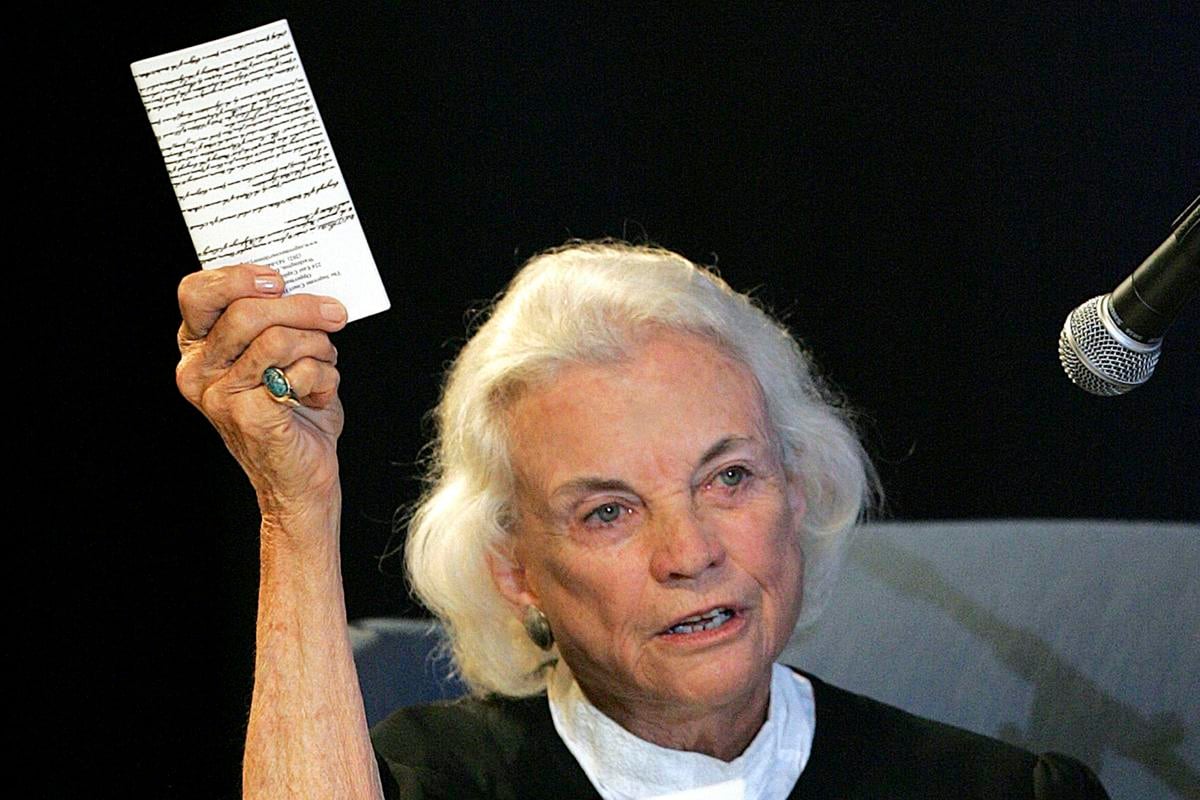Sandra Day O’Connor, the first woman to serve on the U.S. Supreme Court, a Republican, was considered a moderate conservative, who was often the “swing” or deciding vote. Here are some of her noted votes and opinions:
EQUAL AND CIVIL RIGHTS
1982: O’Connor wrote the majority opinion in Mississippi University for Women v. Hogan, which ruled the nursing school had to admit men to the traditionally women’s-only program. She wrote that excluding males from admission tends to perpetuate the stereotyped view of nursing as an exclusively women’s job, according to the New York Times archive.
1996: Wrote the majority opinion in Shaw v. Reno, which decided that redistricting based on race must be held to a standard of strict scrutiny under the equal protection clause, and must ensure compliance with the Voting Rights Act of 1965. O’Connor said the district in question “bears an uncomfortable resemblance to political apartheid,” the New York Times reported.
1999: Wrote the majority opinion in Aurelia Davis v. Monroe County Board of Education, a sexual harassment ruling that the school board was responsible for protecting a fifth-grade student from unwanted advances from another student.
2003: Was the deciding vote on Grutter v. Bollinger, which upheld affirmative action at the University of Michigan Law School. O’Connor wrote, “It is necessary that the path to leadership be visibly open to talented and qualified individuals of every race and ethnicity,” according to the Civil Rights Project.
2003: Voted with the majority on Lawrence v. Texas, to strike down as unconstitutional the “Texas Sodomy Law,” which criminalized same-sex sexual activity. O’Connor wrote in her concurring opinion that marriage should be limited to heterosexual couples “to preserve the traditional institution of marriage”; however, she did not feel law enforcement had the unrestricted right to enter someone’s home to see what consenting adults were doing.
2004: Voted with the majority on Hamdi v. Rumsfeld, the case of a U.S. citizen arrested as a Taliban combatant in Afghanistan, ruling that Americans were entitled to due process even when they were detained overseas in wartime. The citizen was named an “enemy combatant,” locked in prison and held incommunicado with no charges filed. O’Connor wrote that “we reaffirm today the fundamental nature of a citizen’s right to be free from involuntary confinement by his own government without due process of law, and we weigh the opposing governmental interests against the curtailment of liberty that such confinement entails,” the New York Times reported.
ABORTION
1992: O’Connor stated her personal abhorrence of abortion during her confirmation vetting process, but supported a person’s right to make privacy decisions about his or her own body.
O’Connor voted with the majority to uphold Roe v. Wade, the 1973 case that legalized abortion, when ruling in Planned Parenthood of Southeastern Pennsylvania v. Casey.
The ruling also imposed a new standard to determine the validity of state laws restricting abortions: asking whether a state abortion regulation has the purpose or effect of imposing an “undue burden,” according to Oyez, judicial archive of the U.S. Supreme Court.
The joint opinion that O’Connor shared with Anthony Kennedy and David Souter acknowledged the need for predictability and consistency in judicial decision making.
2000: Later she voted with the majority in Stenberg v. Carhart to strike down state laws banning the medical procedure that critics call “partial-birth” abortion. The court held that the laws violated the U.S. Constitution, as interpreted in Casey and Roe, because they placed an undue burden on a woman’s right to have an abortion and did not not provide a “health exception” for pregnant women facing a medical emergency.
BUSH V. GORE
2000: O’Connor cast the deciding vote on the Bush v. Gore case in 2000. The ruling effectively ended the recount of votes in Florida for the presidential race, upheld the original certification of the state’s electoral votes, and enabled George W. Bush to become president.
In 2003, O’Connor admitted misgivings about the highest court weighing in on the election. CBS reported that she told the Chicago Tribune editorial board that perhaps the court should have denied the Bush campaign’s appeal of a Florida Supreme Court decision to allow a recount requested by the Gore campaign. She said the controversy over the decision gave the court a “less-than-perfect reputation.”





